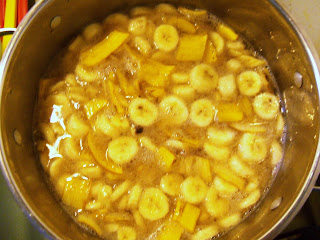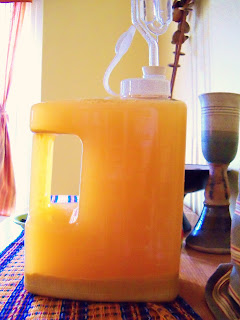
The Ramble: Doesn't it sound so tropical? For a long time I knew that people made banana wine, and I had even read some banana wine recipes, but I didn't think I would like it. Then the more I thought about it, the more I needed to try it, and the better it sounded to me. Plus, I got five pounds of bananas for free! One of the coolest things about this recipe is that you chop up the banana skins to get out their natural tannins. They can be used in other wines too, but beware, they may leave a hint of banana on the nose!
Recipe:

4 lbs. peeled, chopped bananas (about 15-20 bananas)
juice of 2 lemons or 2 tsp. citric acid blend
1/4 to 1/2 lb. of chopped banana skins (4-5 skins)
1 gallon water
2 lbs. sugar
1 tsp. yeast nutrient
1/2 tsp pectic enzyme
white wine yeast (used K1V)
Peel bananas, chop bananas and skins, add to stock pot. Add water. Add lemon juice or acid blend. Bring to a boil, then simmer for 30 minutes. Let cool to room temp. This extracts tannins, sugars, flavor, and kills of wild yeasts. Add pectic enzyme, let sit overnight.
 Next day, strain out the pulp/skins. Add sugar and nutrient, stirring well to make sure everything is dissolved. Add wine yeast, place in sanitized fermentor with an airlock, and voila!
Next day, strain out the pulp/skins. Add sugar and nutrient, stirring well to make sure everything is dissolved. Add wine yeast, place in sanitized fermentor with an airlock, and voila!This wine can take a long time to clear, just be patient. Bottle age for one year, if you can wait.
Enjoy.



















